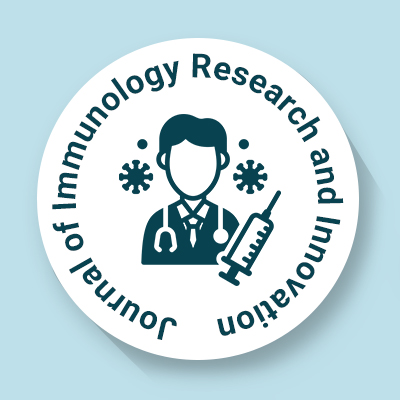
Journal of Immunology Research and Innovation
OPEN ACCESS

OPEN ACCESS
Allergies, or allergic disorders, refer to a variety of conditions that arise from the immune system's excessive response to non-harmful materials called allergens. These reactions can range from mild symptoms like sneezing and itchy eyes to supreme responses such as anaphylaxis. Typical allergens include pollen, specific foods, metals, bug stings, and drugs. Allergies arise from a mix of genetic and environmental influences, with some individuals being more open to developing hypersensitive immune reactions.
The immune system reacts to an allergen with a particular antibody known as immunoglobulin E (IgE). When IgE comes into contact with an allergen, it attaches itself and starts the release of substances, such as histamine, from cells known as mast cells or basophils. This production triggers inflammation and results in the usual signs of an allergic response.
Allergy symptoms vary and may consist of itchy, red eyes, coughing, swelling, and difficulty breathing. Skin allergies frequently result in rashes, inflammation, whereas severe responses may trigger vomiting and potentially anaphylaxis, a critical condition that demands urgent medical care. Inhaled allergens such as pollen and dust mainly impact the eyes, nose, and lungs, leading to issues like hay fever. This results in sneezing, itching, blocked nasal passages, and red eye. Allergic asthma may also arise when inhaled allergens trigger inflammation in the lungs, leading to coughing and trouble breathing.
Allergies from contact with substances like latex or particular metals can result in skin reactions such as eczema, referred to as contact dermatitis. This condition leads to redness, swelling, and irritation on the surface of the skin. In certain instances, stings from insects like bees or wasps can cause a local allergic response characterized by redness and swelling near the sting area.
Allergies are usually identified through a patient's medical background, symptoms, and, in certain situations, further examinations. Skin prick tests entail applying tiny quantities of allergens to the skin to monitor responses, whereas blood tests can identify specific IgE antibodies associated with particular allergens.
The main strategy to prevent allergies is to know the allergens, although early exposure to specific allergens, especially during childhood, could lower the chances of developing allergies in the future. Management typically consists of steering clear of triggers, using medications like antihistamines, steroids, and mast cell stabilizers, and, in critical situations, administering epinephrine for immediate relief. Allergen immunotherapy, often referred to as allergy shots, is an alternative treatment that assists individuals in gradually developing a tolerance to certain allergens over time.
Allergies are immune system responses to harmless substances, with symptoms extending from mild irritation to severe reactions. Through proper diagnosis and treatment, individuals can manage their symptoms and reduce the impact of allergies on their lives.